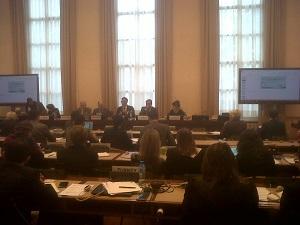Event
Innovation for Sustainable Production
26 - 27 Mar 2018
15 : 30 - 13 : 00 CEST
In person
Switzerland
United Nations Economic Commission for Europe
Committee on Innovation, Competitiveness and Public-Private Partnership
Day one included -
Setting the stage – doing more with less: why Innovative Partnerships for Sustainable Development
The economic opportunities inherent in the notion of sustainable production and consumption offers a myriad of opportunities for partnerships among governments, business, academia, and civil society to find and develop practical solutions.
Despite these opportunities several obstacles remain. These include regulation with a negative impact, market failures, lack of institutional capacities, social factors (e.g. lack of knowledge and experience) and unaccounted externalities (e.g. pollution or resource depletion). Policy makers should not only create the right enabling conditions for such initiatives, but also address market failures and help create new markets by partnering with the private sector to reduce the risks
inherent in innovative pilot projects. This session introduces the role of innovation and partnerships at national and regional level to facilitate the transition to a circular economy.
Speakers included Councillor Lisa Trickett, discussing Industrial Symbiosis in Birmingham and the impact this is having on the economy.

Day two included -
Innovation for Sustainable Production and Consumption
The circular economy transition requires innovation and innovative business practices overall – in design, production, delivery models, and life cycle management. Policy makers, entrepreneurs and innovators need continuous, multi-level dialogue to understand these opportunities, remove bottlenecks, and ensure that incentives are fit for purpose. Based on case studies from across the ECE region, this session presents successful examples on innovation and innovative partnerships for a circular economy and it draws conclusions on best practices.
Committee on Innovation, Competitiveness and Public-Private Partnership
Day one included -
Setting the stage – doing more with less: why Innovative Partnerships for Sustainable Development
The economic opportunities inherent in the notion of sustainable production and consumption offers a myriad of opportunities for partnerships among governments, business, academia, and civil society to find and develop practical solutions.
Despite these opportunities several obstacles remain. These include regulation with a negative impact, market failures, lack of institutional capacities, social factors (e.g. lack of knowledge and experience) and unaccounted externalities (e.g. pollution or resource depletion). Policy makers should not only create the right enabling conditions for such initiatives, but also address market failures and help create new markets by partnering with the private sector to reduce the risks
inherent in innovative pilot projects. This session introduces the role of innovation and partnerships at national and regional level to facilitate the transition to a circular economy.
Speakers included Councillor Lisa Trickett, discussing Industrial Symbiosis in Birmingham and the impact this is having on the economy.
Image

Day two included -
Innovation for Sustainable Production and Consumption
The circular economy transition requires innovation and innovative business practices overall – in design, production, delivery models, and life cycle management. Policy makers, entrepreneurs and innovators need continuous, multi-level dialogue to understand these opportunities, remove bottlenecks, and ensure that incentives are fit for purpose. Based on case studies from across the ECE region, this session presents successful examples on innovation and innovative partnerships for a circular economy and it draws conclusions on best practices.